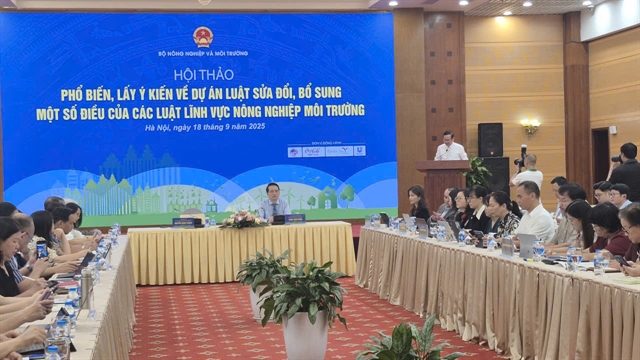 Society
Society


|
| Delegates discuss proposed amendments at the workshop. — VNS Photo Tố Như |
HÀ NỘI — Policymakers are ploughing ahead with a draft law that seeks to amend 15 existing laws in agriculture, environment and natural resources, aiming to streamline regulations, ease business procedures and resolve long-standing legal bottlenecks.
The draft was the focus of a workshop in Hà Nội on Thursday, jointly organised by the Nông nghiệp và Môi Trường (Agriculture and Environment) newspaper and the Ministry of Agriculture and Environment’s Legal Department.
If passed, the law would take effect on January 1, 2026, though certain provisions on water resource planning and inter-provincial irrigation infrastructure are expected to be delayed until 2027 to allow time for preparation.
According to the ministry, the draft law is designed around three key priorities.
First, it seeks to formalise the decentralisation of state management, clarifying powers and responsibilities in line with Việt Nam’s new two-tier local government model.
Second, it aims to simplify administrative procedures and cut conditions for business investment across multiple sectors, reducing compliance costs for both enterprises and citizens. In fact, 75 provisions in 11 existing laws are slated for revision under this approach.
Third, the draft addresses urgent gaps that have emerged in the enforcement of nine key laws, including those governing environmental impact assessments, waste management, forest land conversion, groundwater exploitation, and the handling of construction within dyke protection zones.
Industry representatives and business associations attending the workshop welcomed the draft’s direction. They highlighted the Government’s commitment to building a clear and transparent legal framework that would underpin green growth, the circular economy and enhanced national competitiveness.
However, many said that in order to be effective, the revised regulations must be practical, feasible and minimise unnecessary bureaucratic burdens.
The American Chamber of Commerce in Việt Nam (AmCham) noted that some provisions remained too rigid, particularly those related to Extended Producer Responsibility (EPR).
AmCham proposed clearer incentives for the use of recycled materials such as recycled PET plastics and urged that EPR costs be recognised as deductible expenses for corporate income tax purposes. It also called for more responsibility to be placed on industrial park investors for wastewater treatment connections and for environmental licensing procedures to be digitalised.
Unilever Việt Nam voiced similar concerns, suggesting greater flexibility in how EPR obligations can be met. The company proposed that businesses be allowed to both recycle directly and contribute to the EPR fund, with financial contributions permitted instead of penalties if recycling targets are not fully achieved.
It also recommended that the fund be used more effectively to develop collection and recycling infrastructure while providing priority incentives for eco-friendly packaging and designs that support recycling.
Many participants said local governments should play a stronger role in implementing EPR, noting that post-consumer waste management is directly linked to their responsibilities in community-level administration. Greater coordination between central authorities, enterprises and localities was seen as essential to achieving real results.
The Ministry of Agriculture and Environment plans to submit the draft to the Government this week, along with proposed amendments to the Land Law and the Law on Geology and Minerals, for consideration at the 15th National Assembly’s 10th session later this year. — VNS




